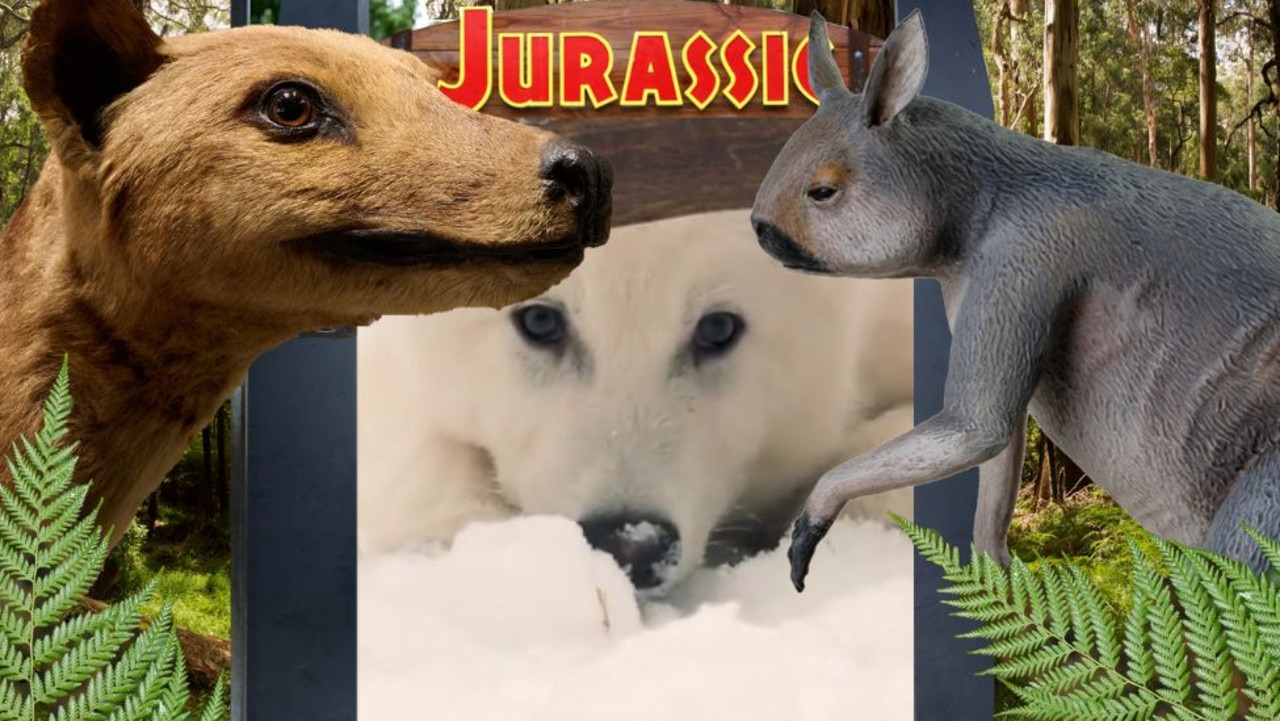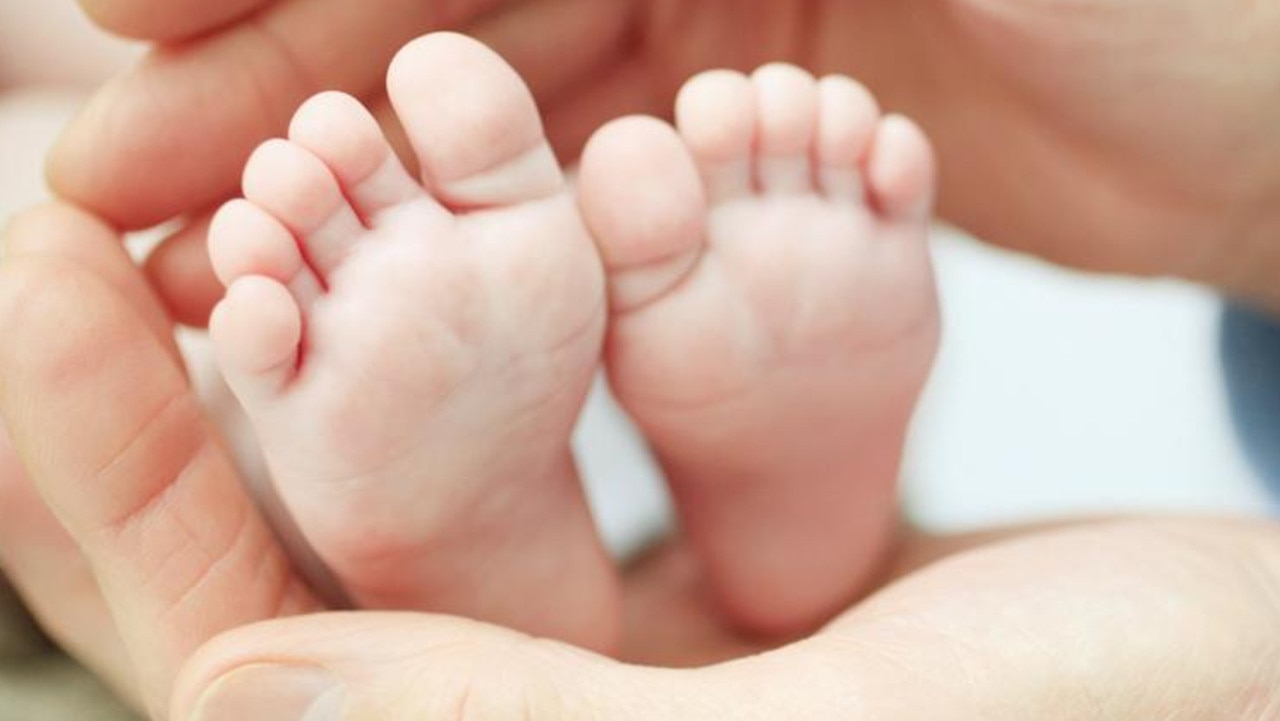AFL’s Oskar Baker, Hugh Greenwood and Sonja Hood on how breast cancer has touched their lives
In an emotive interview, Oskar Baker and Hugh Greenwood have told all about losing their mums as teenagers while Sonja Hood has shared how she found out she had the disease.

Victoria
Don't miss out on the headlines from Victoria. Followed categories will be added to My News.
Western Bulldogs’ Oskar Baker and North Melbourne’s Hugh Greenwood both lost their mums to breast cancer. Kangaroos president Sonja Hood is living with it. We sat down together on Thursday night at the MCG to talk about their respective breast cancer journeys. We talked, and cried. A lot.
HM: Nice to see you all. Son, what did you know about breast cancer before 2019?
SH: I knew the pink lady, and that’s probably about it. There wasn’t a lot of it in my life, I didn’t have a lot of cancer in my family, Mum got it just before Covid and that was the first time it had hit our family. I just thought it was one of those things.
HM: And from there, what did you learn about it?
SH: I learnt there are lots of different kinds. I’ve learnt there are incredible treatments, I’ve learnt that plenty of people have it and live with it, and others don’t. I’ve learnt that there’s not one way of treating or diagnosing it, and that where you are in your life, the country and the journey, that kind of dictates a lot of what happens to you next. If you had to have it anywhere, having it where I had it is the best place in the world.
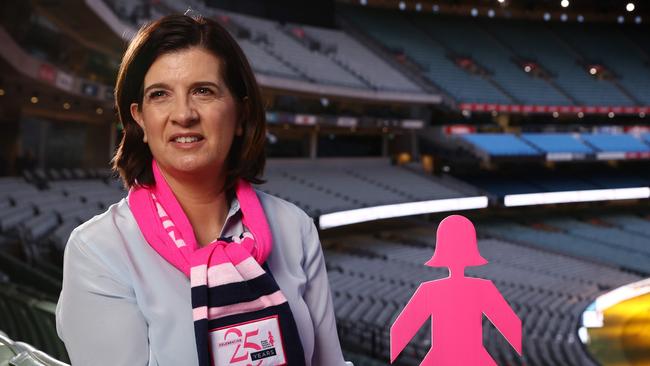
HM: Oskar, what did you know before your mum, Trudie, was diagnosed?
OB: Very similar to Sonja, very little. Just the pink lady match, essentially, watching it on TV as a kid. I had no idea about breast cancer until it hit my family, and unfortunately, it’s changed our lives for the worst.
HM: How were you told?
OB: My mum sat me down with my sister and broke the news to us that she had been diagnosed with breast cancer. I remember bawling my eyes out as a little kid, but in that moment, I still didn’t fully understand it, or what was ahead for me and my family. It was a difficult journey that I wouldn’t wish upon anyone.
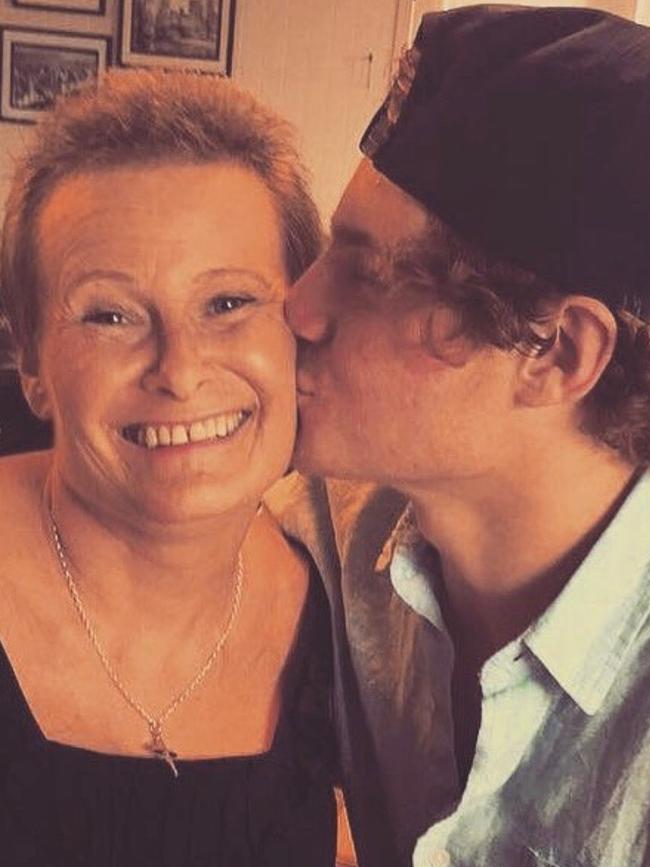
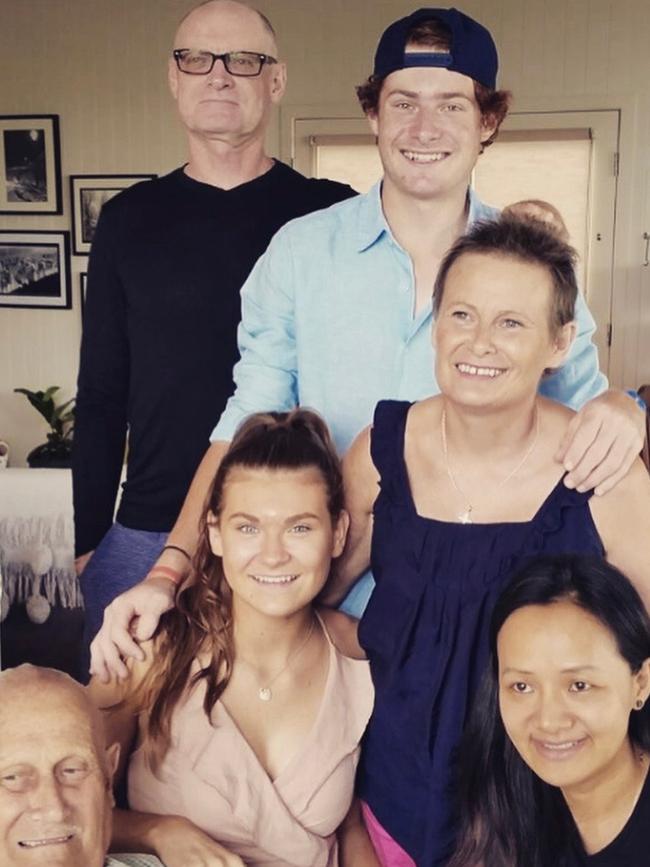
HM: You were only 12 or 13 at the time?
OB: I was very young. I’d just started high school. It was multiple trips to the hospital on the weekends, when Mum was doing chemotherapy. I remember playing footy as a little kid and instead of seeing my mates after games, I’d be going to the hospital to visit Mum to see what she was going through. It was incredibly difficult.
HM: Hughey, your mum Andree, ‘Onny’, was a huge influence in your life. How did you find out that she had breast cancer?
HG: She was always so selfless, and so protective of my sister and me. She got the news at the beginning of the same week I had my AIS graduation, so she sat on the news until we’d had the presentation on the Friday night. I got a call on the Saturday morning saying that she had breast cancer. I was living in Canberra at the time, she was based in Hobart, so it was a quick trip home to spend time with her. We didn’t have a whole lot of information at the time and having not known a whole lot about breast cancer, I didn’t know what it truly meant to be living it. That was going to be us for the next 10 years. It was quite surreal, but she was so protective.
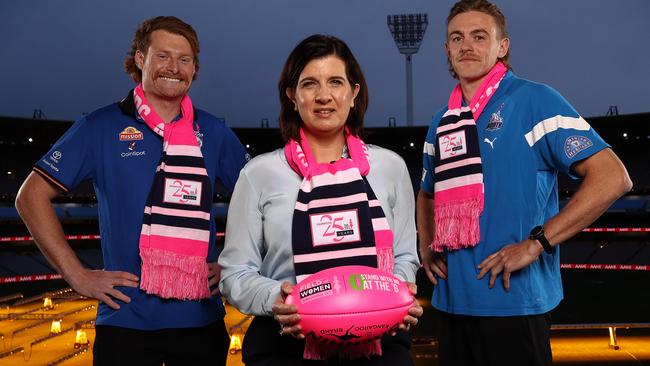
HM: That was in 2009 – when you hear anyone has cancer it’s terrifying, when it’s your mother, what do you do? Is it a Google search? A call to a doctor?
HG: First thing they said was “Don’t go to Google”. But you can’t help yourself. I lived away from home, and I went straight back to my dorm room and straight back on Google, which is not the best thing to do. I lost my grandfather, Mum’s dad, to cancer a few years before that. We’d had cancer in the family before and having him pass away you assume the worst. Mum had a unique type of breast cancer, there wasn’t a whole lot of information about it at that time. As a 17-year-old, you just want as much information at the time as you can, and you help where you can, but there’s not a whole lot you can do.
HM: Your dream was to go and play basketball overseas and play at College in the US. Did you think about staying put?
HG: I did think about it. But it was the dream from the early years, to go and live the college dream and play basketball over there and live on the other side of the world. When you get the news that your mum is sick, and you’re not sure how long she is going to survive, that’s when I started thinking about sticking around in Australia and playing footy. I remember having some meetings with NBL clubs and some AFL clubs about sticking around in Australia. Mum wasn’t going to let that happen, she was going to make sure that I took off and lived the dream. She’d be fighting to see as much of it as she could.
HM: Was she open with the information she was getting, or always protecting her kids?
HG: Always protecting her kids. I spent another two years in Canberra before taking off overseas, and there was a bit of guilt in a way that I was sheltered from the bad days. When you get the phone calls and the Zoom calls, she’d put on a brave face. My sister and my dad had to live it every day, Oskar was there to go to all those treatments, but I was sheltered from a lot of the hard stuff. She was so selfless and so protective of us, she wanted to make sure that I was focused on my dreams, and she was taking care of the rest of the family at home.
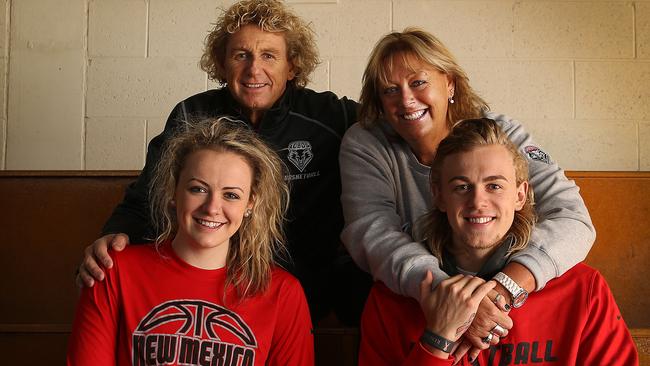
HM: So, tell me what happened in January 2023?
SH: I was getting through my “Life Admin” as you do in January. I was getting through the backlog of stuff that I hadn’t done. 2022 had been a full-on year for me. In January I got around to making the appointment that had been sitting in my bag since September, to have the mammogram and ultrasound that I had agreed I would have with my GP on regular intervals.
HM: You weren’t worried about anything at the time?
SH: No. I thought it was all overkill. I nearly didn’t do it. I thought “I don’t have time, I’m busy, there are people much more important and sicker than me”. I went to hospital on Friday the 13th, it all went well, had my ultrasound, my mammogram, and went for a meeting with someone who works for me at a Cafe in Balaclava.
HM: Then?
SH: I got a call from my GP surgery, which was unusual, and the receptionist said that the doctor wanted to see me at 4pm. I walked into my GP’s surgery, and she said, “There’s no good way for me to tell you this – you’ve got cancer. You won’t hear anything I’m saying from now on, so I’ve made an appointment for you tomorrow morning, and I’ll say it all again to you then”. She walked me through what would happen from there. It was an absolute tsunami. From Monday I had appointments with a specialist, I had tests on the Tuesday, I had MRI’s, I had something every day that following week, so we could work out what it was, how urgently it needed to be dealt with, and how severe it was. It was just a tsunami of tests and decisions coming at me, I wasn’t prepared for it. By the end of the week, I’d worked out that I could only consume enough information for the next decision. It was all too much, and if I went down Dr Google, it wouldn’t end well.
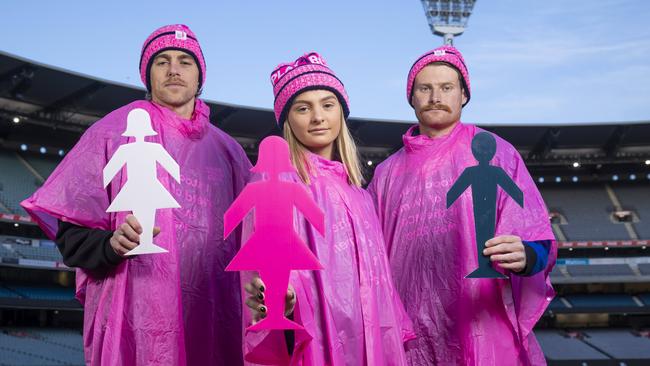
HM: Did you go on Google?
SH: Once, and that was it – no more! I picked websites that I trusted, places I trusted, like the BCNA. I was just going to focus in on that level of information. I got a text message from someone in football to say they’d heard I’d had a medical diagnosis – they were sending their support. No one knew at that point. I realised the news was going to get ahead of me, whether I wanted it to or not. I decided to be public about what was happening it, and I wasn’t prepared for what came with that either. The outpouring of support was unbelievable, but you’re in an emotional state that you’re just not prepared for yourself. It felt like I couldn’t escape having cancer. After two weeks I had a team, I had an oncologist, I had a breast surgeon, a plastic surgeon, just an incredible team of people around me to help me make my decisions. It went from there.
HM: At what stage did you give the nickname ‘The Walrus’?
SH: The first day we went in to see the specialist, I’d seen the doctor on the Friday and had the weekend to come to terms with it. I’m thinking, no one can diagnose you with cancer after a scan. Surely, they must test it …
HM: Were you not believing?
SH: I was in a state of maybe this isn’t right. Maybe there is a mistake here. I don’t think I was in denial, but I’m a logical thinker, I was in a logical place where it didn’t feel right. I went and saw the specialist on the Monday, we got to the scan, and she explained to me what I was looking at. When all the testing came back a week later, we found out that it was much bigger than they thought, it was much angrier than they thought, it was the highest grade it can be, but it was very slow growing. It was fat, angry and lazy – so we named it the walrus. Right through until surgery, it was the walrus. That was how I dealt with it.
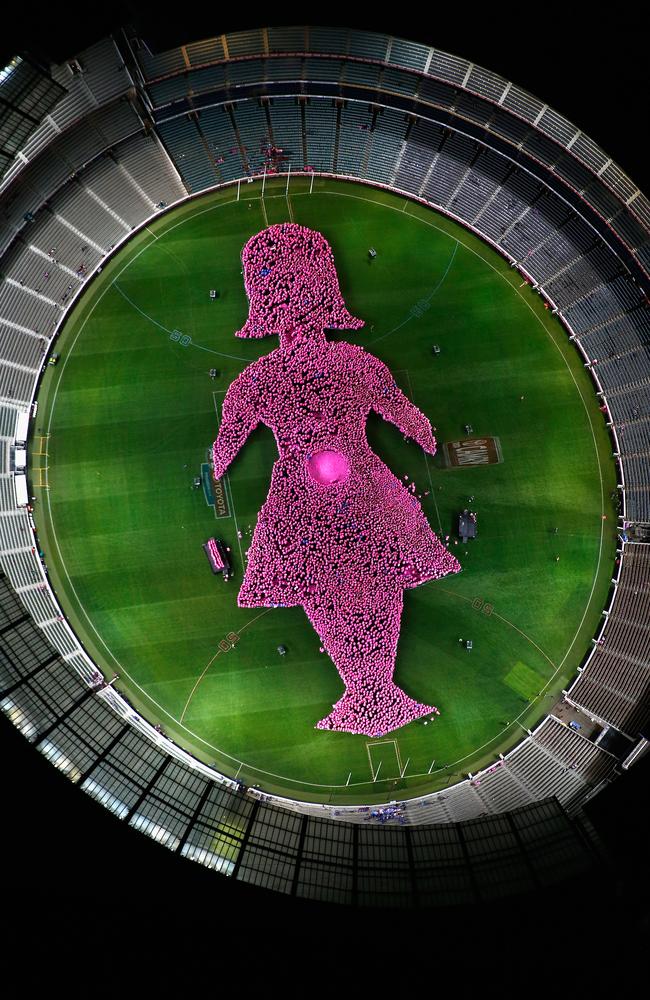
HM: What are the options at that point?
SH: At that point, you’re talking about a lumpectomy versus a mastectomy, and the lumpectomy probably wasn’t an option for me anymore because of the size of what we were dealing with. They could have done it, but it just meant complication and other things. We decided on a mastectomy, then you decide between reconstruction. Are you going to use implants, which is quick and less invasive, but you need to have the surgery every five to ten years? Or are you going to do a tissue reconstruction, which means they take a part of your body and rebuild a breast from body tissue. I didn’t even know that was a thing, but from the moment I discovered that it was I thought, that’s me. That’s what I want to do. I went down that route, it’s a long surgery, it’s quite complicated, very clever people do it. I had to wait six weeks to have that surgery. That meant they could do drug treatment in the lead up to see if the tumour responded, which it did. That meant I didn’t have to have chemotherapy after surgery, they just kept going with the drug treatment instead. I had the major surgery, and I was out of action for a couple of months, just healing and relearning how to use my body.
HM: I was told, “Sonja is the model patient. No drinking, lots of exercising, and weekly acupuncture”.
SH: Hame, if they say it will help, I’ll do it. I am a doctor’s dream. When you are president of the North Melbourne Football Club, giving up alcohol is no small thing!
HM: I understand. Do you feel fearful of a reoccurrence?
SH: Not yet. One of the things they did, as well as the drug treatment, was they put me on an antidepressant to deal with the side effects of the drug treatment. My oncologist who is the most beautiful man, except he barracks for Hawthorn, said to me when he put me on the antidepressants, “We are not giving this to you because you’re depressed”. He must have said it to me five times. It’s meant that I’ve had a far less emotional response to these things than maybe I would have had. The second thing I would say is I understand from people that the fear of reoccurrence often kicks in on anniversary dates. I listen to these guys and what their mums went through, and I realise, there’s not an end to this journey. You have a permanent relationship with this thing that you never asked for.
HM: As soon as you hear the word ‘cancer’, you think of your mortality. Did you go there?
SH: No, I was way more scared of being sick. I feared being unable to live my life anymore, I feared being unable to do the things that bring me joy, and it didn’t even occur to me that I might die. It should have, but that’s so distant to me as a concept, but sickness isn’t. That worried me a lot.
HM: Oskar, describe your mum, Trudie.
OB: An absolute character. A bundle of joy, always smiling, always cracking jokes, the family clown, I would say.
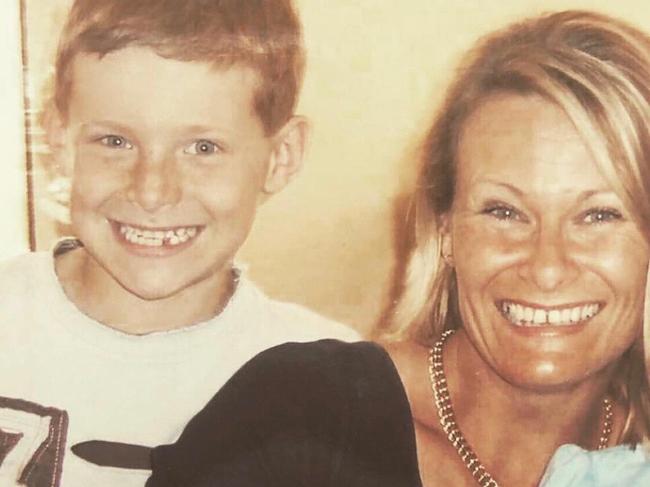
HM: She passed away four days before your 19th birthday?
OB: That’s correct, yeah, she did.
HM: What was the promise you made to her?
OB: I promised her that I’d get drafted and become an AFL player.
HM: You were drafted soon afterwards.
OB: Three or four months afterwards.
HM: You said, “I will play an AFL game for you”. When you did?
OB: It was incredibly special. I’m sure a lot of people have seen the jumper presentation, with my old man giving me my first jumper. There was so much emotion in that room. I know he’d been pre-planning that speech for a long time, and to receive the jumper from him, and the words that were spoken that night. Mum was with me for my first game, and she has been every game thereafter.
HM: Do you play every game with a black arm band?
OB: Every single game since her passing. Yep. I always will.
HM: How often do you think of Trudie?
OB: Every day. Every single day.
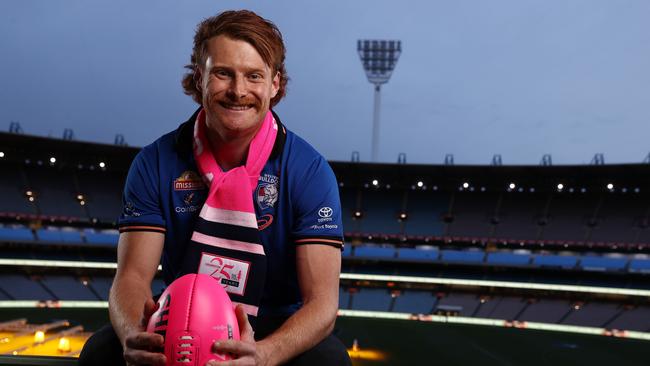
HM: Hugh, your mum was your coach at one point, wasn’t she?
HG: She was.
HM: Football or basketball?
HG: Basketball. I was always going to play footy, Mum was a basketballer, she won a WNBL Championship, so she was the basketballer in the family. I said, “Mum, I’ll play if you coach me”. She wanted to get me into a team first. She took me down to a local club, I rolled in, and they said they had too many numbers; “We’re not going to take him”. She said, “tuff that, we’ll go start our own team!”. We did that, and she was my coach, from U10’s all the way through until I left the Institute. She taught me everything I know.
HM: It was a 9-year cancer journey for Onny. She said “Go and follow your dreams”. In 2017 things got a little more dire.
HG: Similar to Oskar, we made a promise to one another that I would live out my dream, and she’d be there to see it happen. I promised her that I’d play in the Olympics and get drafted into the NBA. When that didn’t happen, I felt like I had let her down. When I came back to Australia, the commitment I made was that I’d make it at the highest level in my chosen sport. I said, “What if I try football? What if I make it into the AFL?” When I told her I was retiring from basketball and going to footy, she was sceptical, but very, very supportive. I spent a year in the SANFL and wasn’t looking anywhere near AFL level. She had been diagnosed with secondary breast cancer, so she was on a limited time frame. We made a commitment to one another that she would be here when I made my debut.
HM: And she was.
HG: She kept her promise. I got to make my debut, and played in an AFL Grand Final that year. We knew that the grand final was going to be the last game she ever saw me play. I played the grand final and went off to the States.
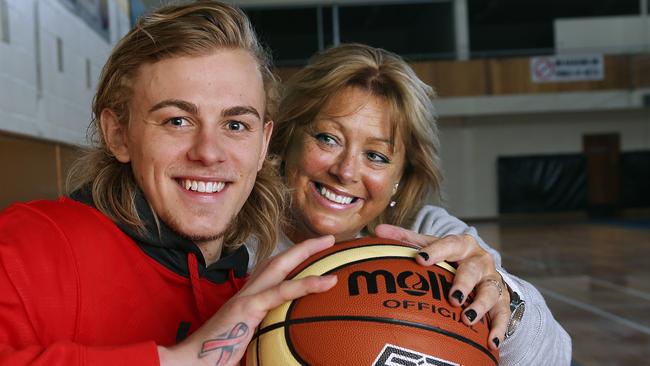
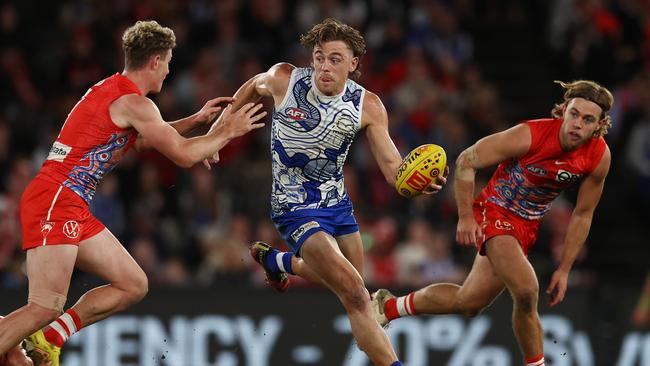
HM: What was the first phone call you got?
HG: I was there for a day when got a call from Dad. He said that Mum had exhausted all her treatment options, so she was at the point that she’d fought for so long, but she’d run out of treatment options. She was likely going to pass away by the Friday. I couldn’t get a flight until Wednesday, and I lost two days in the air, and would arrive back in Australia by Friday. I was in the air not knowing whether she was going to be there. I was thinking about what I would say to her when I got home. All of the thank you’s, all the things you loved about her, all the things you promised her you were going to do. I got home, and there she was, stubborn as anything, resilient, still there, still awake. I got to speak with her. Laugh with her. I got home on Friday, she fell asleep on Saturday night, and passed away on Sunday morning.
HM: She waited for you.
HG: Yeah, I think she did Hame.
HM: Did you write down everything you wanted to say?
HG: I tried. I figured I wouldn’t be able to say everything clearly with all the emotion, so I wrote a letter, and she lay there as I read it to her. I still have that letter, and funnily enough, she had a letter for me as well. She had a letter for all of us. You could tell that she had been writing for a while, the writing was neat to start off with, by the end not so much. She’d been sitting and plugging away at it for a couple of years. She left us all a little box with our favourite CD’s, music, notes, books, and memorabilia. She wore the same badge to all my games. She left us little care packages, which was nice. It still sits by my bed.
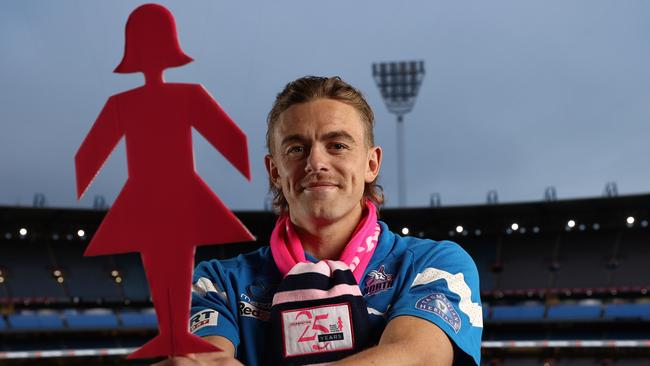
HM: Did she get to most of your games, or wasn’t well enough?
HG: She got to most. She’d came over to the States too. We had a good connection with the New Mexico Cancer Centre. They loved her story, and we had our own fundraising campaign over there. We raised $100,000 for the cancer centre in New Mexico. She would go over there and get her treatments and give back in that way. She just loved living her life, she grew up in the States, loved her shopping! She was on so many different treatments that she developed stress fractures in her feet from shopping so much!
HM: (laughs) …. from walking the malls?
HG: Just walking the malls, flat out! She just wanted to live her life. She got back, and she was told she needed to wear two moon boots. She refused to wear two, she said she would wear one and when that one gets better, she’d swap it to the other foot. She just continued to live her life. That was off the back of Dad pushing her to do all these things. She had a bucket list, but she spelt with an ‘f’ – that she wanted to tick off before her time was up! It was Dad’s job to get her to all these places. She couldn’t get health insurance but still went to Noumea, still watched us all graduate, she watched me make my debut, she got a car, paid off the house.
HM: Were there many left unticked?
HG: Africa was the only one she couldn’t tick – because her system was so shot, and she couldn’t get health insurance. If anything went wrong over there, she would have been in all sorts. She didn’t tick that one off. The other one was to meet her grandkids, which was tough. We know she is watching over us.
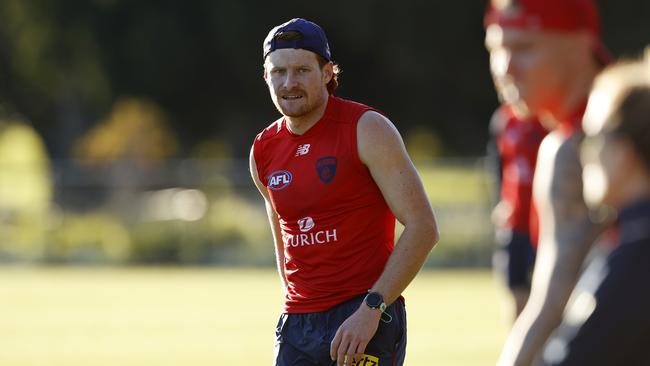
HM: Her last game of football was here.
HG: Yep. Here at the MCG.
HM: And you’ll be out on the ground on Sunday for the first time in the Field of Women.
HG: It’s the same ground that my grandfather lined up and won three flags for Melbourne on. Whenever I walk on that ground, especially out to that goalsquare, I know that he’s still there. To know that mum has been to a Field of Women game, in 2014, she’s had the pink poncho on before, and been in that environment before. To be out there on the G’ to play, but also be on the field of women, will be surreal.
HM: How abrupt was Trudie’s end?
OB: I still remember the day Dad broke me the news so clearly in my head. I was a teenager, 18 at the time, and I was at a mate’s place playing backyard cricket, kicking the footy. I got a call from Dad, and Mum had gone into hospital a couple of days prior for a blood transfusion. She ended up spending a couple of days in there. I was at my mate’s place, I got a call from Dad, and he said “Mate, I need you to come home”. Me being a teenager, I said, “Oh, you serious? I’m playing backyard cricket”. I drove 10 minutes home and walked in the front door. Dad was tearing up. It was unusual because I’d never really seen Dad cry. He just said to me, “Mum’s not coming home”. I fell to the ground. You never think it’s going to happen to you. I started bawling my eyes out, I was hugging my Dad, my sister was at school at the time, and my auntie had gone to pick her up from school. She came home half an hour later, and Dad said the same thing to her. She threw her schoolbag on the ground, collapsed to the ground and cried hysterically. I remember sharing a moment for about five minutes for my sister, I just said, “I never thought in any world that this would happen to us”.
HM: It happens to others?
OB: That’s what I thought! You see it happen to other people, but you never think it’s going to hurt your family. When it did, it shook our world. We went to the hospital after that point, and Mum was conscious, but only just. One of the last things I said to her was, “I will play an AFL game, I will be on an AFL list, I promise you”. She was always the one that kept the dream alive in my head. I had so many doubters saying that I wouldn’t be able to make it, but she was always the one that reassured me that I could. To give her that promise, and be able to fulfil it, is something I’ll look back on every day. I am so proud of myself, as is my family. I’m sure she would be too.
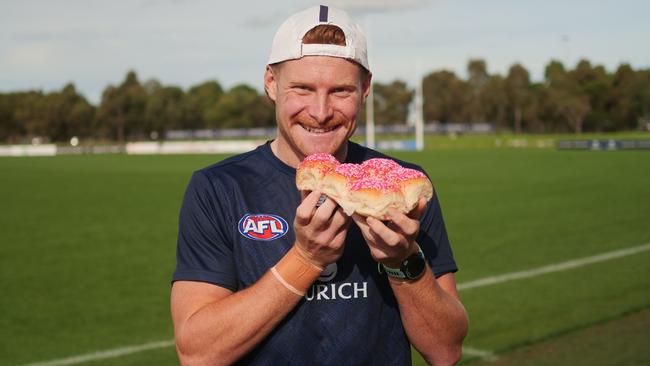
HM: Did it bring your family closer together?
OB: Absolutely. My Dad and I have always been extremely close, but when he starts playing the role of two parents, that bond becomes even more special. Dad is addicted to footy, so I’m not only living my dream, but I’m also living his dream as well. That’s incredibly special. The same goes with my sister, we are incredibly close. I talk to them every day, they try and get to Melbourne as much as they can to watch me play, and I spend a lot of my down time in the off season back up there.
HM: The one thing Son, is we need to find a way to get money to the best minds in the world.
SH: 100%. The treatments, even the things that were available to me, they are different than they would have been if I was diagnosed five or ten years ago, and they’ll be different if my daughter ends up with this. We must stop it, and we need to stop people dying from it. That is all manageable. We must make sure people have the right information at the points that they need to make decisions, and the right support and help for family members to understand what is going on.
HM: The last Field of Women was five years ago – since then, 100,000 Australians have been diagnosed and 15,000 Australians have died. It’s hard to compute, isn’t it?
SH: What shakes me about that is I’m one of those 100,000. For me, this is no longer a thing that happens to other people.
HM: Oskar, thoughts for those at home?
OB: Anyone that’s going through it, family as well, I am thinking of you. It’s not easy, there will be a challenge ahead, but you need to think as positively as you can. Hug your loved ones.
HM: What was your Mum’s motto, Hugh?
HG: “Make every second count”. That’s why I wore the number 1 for a couple of years, because I had to make every second count. That’s what she did. “You don’t lose your battle to cancer, you beat cancer by the way you live your life”. She certainly did that, and by the sound of it, Oskar’s mum did too. We will see so many of those people here on the weekend, and hopefully we can continue to support, love and put our arms around those affected. 15,000 have passed, and 100,000 have been diagnosed in such a short period of time, so it’s real, and it’s more prominent than you think. Until you’ve lived it, you can’t really comprehend it. BCNA is there for you, we want to support you, we love you, and we’ll see that on Sunday when we all roll out to the G’.
HM: Trudie would be unbelievably proud, so would Onny, and Son, thanks for sharing your story.
Tickets are available to stand on the MCG before the Melbourne and Hawthorn match, or you can support by standing in the virtual Pink Lady, or buy BCNA beanies or scarves – all details at bcna.org.au


